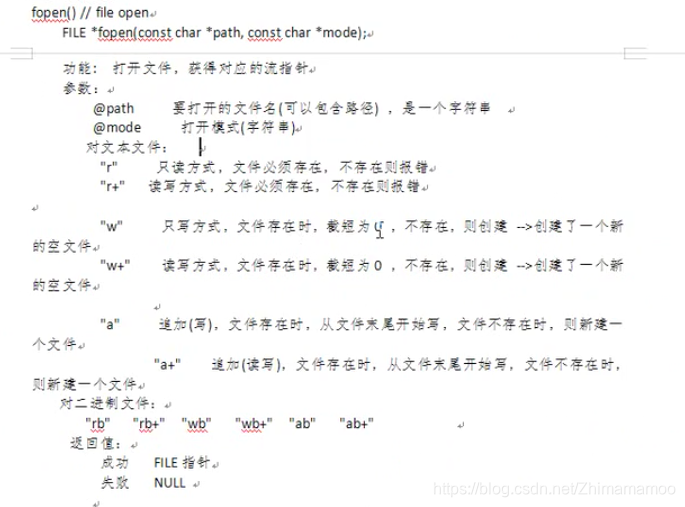open read write close ;man 2 open;man 2 write//这一套
fopen fread fwrite fgets getline fclose//这一套
NAME
read - read from a file descriptor
SYNOPSIS
#include <unistd.h>
man 2 open
NAME
open, openat, creat - open and possibly create a file
SYNOPSIS
#include <sys/types.h>
#include <sys/stat.h>
#include <fcntl.h>
int open(const char *pathname, int flags);
int open(const char *pathname, int flags, mode_t mode);
DESCRIPTION
The open() system call opens the file specified by
pathname. If the specified file does not exist, it may
optionally (if O_CREAT is specified in flags) be cre‐
ated by open().
The return value of open() is a file descriptor, a
small, nonnegative integer that is used in subsequent
system calls (read(2), write(2), lseek(2), fcntl(2),
etc.) to refer to the open file. The file descriptor
returned by a successful call will be the lowest-num‐
bered file descriptor not currently open for the
process.
//下面这段是说明, 如果打开0, 1, 2,关闭了0, 下次在打开一个,就默认是打开0这个进程
By default, the new file descriptor is set to remain
open across an execve(2) (i.e., the FD_CLOEXEC file
descriptor flag described in fcntl(2) is initially dis‐
abled); the O_CLOEXEC flag, described below, can be
used to change this default. The file offset is set to
the beginning of the file (see lseek(2)).
pathname是,路径名字;
要打开的时候有一些flags,是标志;
mode_t mode 文件的权限;
man 2 read
#include <unistd.h>
ssize_t
read(int fildes, void *buf, size_t count);
//返回值显示实际读入了文件的大小,是一个整型
//size_t count是一个预计读入文件的大小,如果cout > SSIZE_MAX,就会出现不可预计的错误。
ERRORS
如果返回的值是-1,那就是一个非法的值
errno
man 2 close
#include <unistd.h>
int close(int fd); //返回-1,On errot
DECRIPTION
close() 文件,文件相关的资源都会被删除的,读写;
man fprintf
SYNOPSIS
int fprintf(FILE *stream, const cahr * format, ... );//基于文件流的打开
man fopen
NAME fopen fdopen freopen
SYNOPSIS
#include <stdio.h>
FILE *fopen(const char *pathname, const char *mode);
描述
打开一个文件流,作为一个字符串;mode 有哪些呢?
r :
r+: Open for reading and writing
w : Truncate file to zero length ir create text file for writing
w+: reading and writing
a : Open for appending (writing at the end of file)
如果文件不存在就会创建一个文件
a+: Open for reading and appending
The mode string can also include letter 'b'就会展现出一个二进制的文件
RETURN VALUE
成功了,就返回一个文件指针; return a FILE pointer
否则出错了,返回一个空指针;NULL is returned and errono is set to indicate the error
man fread
SYNOPSIS
#include <stdio.h>
size_t fread(void *ptr, size_t size, size_t nmemb, FILE *stream);
1. 指针
2. size读多大
3. nmemb 一次读多大
4. 读的那个流
size_t fwrite(const void *ptr, size_t size, size_t nmemb, FILE *stream)
DESCRIPTION
fread()的功能是读nmemb items of data, 每一个size bit的长度,从这个流中读出来
RETURN VALUES
如果fread(), fwrite()成功了,就会返回the numbers of items read or written
这个数字等于什么呢,等于
如果失败了,或者读到了文件的末尾,返回值就会变成一个小的item count或者是0
要区分是读到文件末尾还是读错了,那就需要用到, feof(3), ferror(3)来判断
man 3 fclose
flose 把这个流给他关闭
FCLOSE(3)
SYNOPSIS
#include <stdio.h>
int fclose(FILE *fp)
如果用来关闭一个不合法的文件指针,也不知道会发生什么;
我们在实际使用的时候,一般都会认为自己做的close操作是成功的
man fgets
char *fgets(char *s, int size, FILE *stream)
遇到换行会停止,也就是说是每次都读一行;
1. 把内容放在s指针中
2. 我还会返回也是一个指针
DESCRIPTION
fgets() 读入,如果一个新的行被读入,他的回车也会被读进去;
man get line
ssize_t getline(char **lineptr, size_t *n, FILE *stream);
DESCRIPTION
getline()从stream中读一个整的行,那么这个\n会被读进去
如果 *lineptr 被设置为 NULL, 并且
如果buffer不是足够的大,那我需要重新改变一下大小,
在其他的情况下,*lineptr and *n 都会被更新,是反射一个buffer的地址
EXAMPLE提供一个标准的实践
#define
#include <stdio.h>
#include <stdlib.h>
int main (int arc, char *argv[]) {
FILE *stream;
char *line = NULL;
size_t len = 0;
ssize_t nread;
if (argc != 2) {
fprintf(stdeer, "Usage:%s <file>\n", argv[0]);
exit(EXIT_FAILURE);
}
stream
}
fopen()//file open
使用的时候用到
FILE *fopen(const char *path, const char *mode);
参数:
@path : 指的是要打开的文件名
@mode:打开的模式
比如说我实现一个cat的功能,也就是去读一个文件,这个时候我这样做
#include<stdio.h>
#include<stdlib.h>
#include<string.h>
void read_file(char *pathname);
int main(int argc , char **argv) {
if (argc < 2) {
fprintf(stderr, "Usage : %s file...\n", argv[0]);
exit(1);
}
for (int i = 1; i <= argc - 1; i++) {
printf("%s\n", argv[i]);
read_file(argv[i]);
}
return 0;
}
void read_file(char *pathname) {
FILE *file = NULL;
char buffer[1024] = {0};
if ((file = fopen(pathname, "r") )== NULL) {
perror("fopen");
exit(1);
}
while (fgets(buffer, sizeof(buffer), file) != NULL) {
printf("%s", buffer);
bzero(buffer, sizeof(buffer));
}
}





















 439
439











 被折叠的 条评论
为什么被折叠?
被折叠的 条评论
为什么被折叠?








